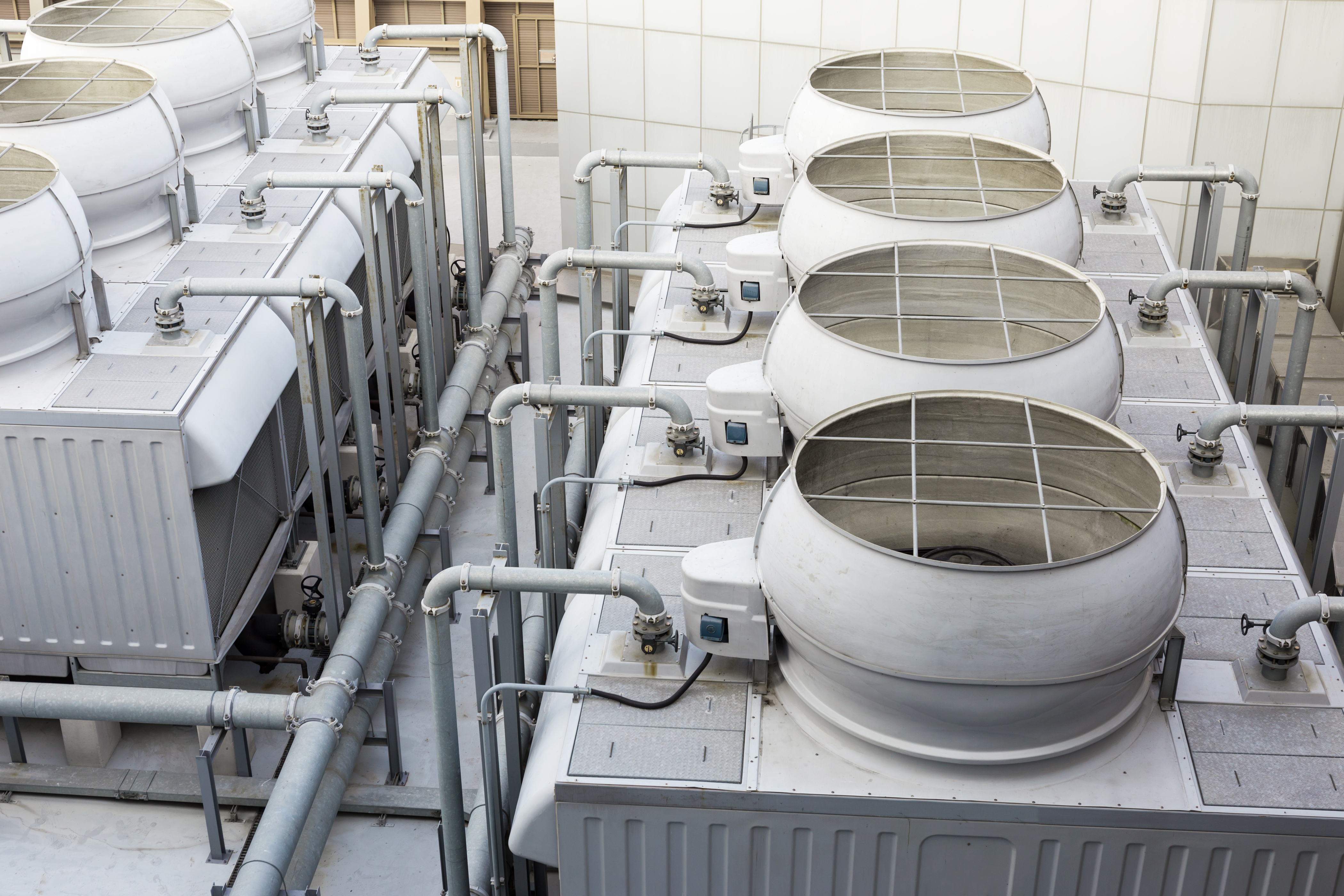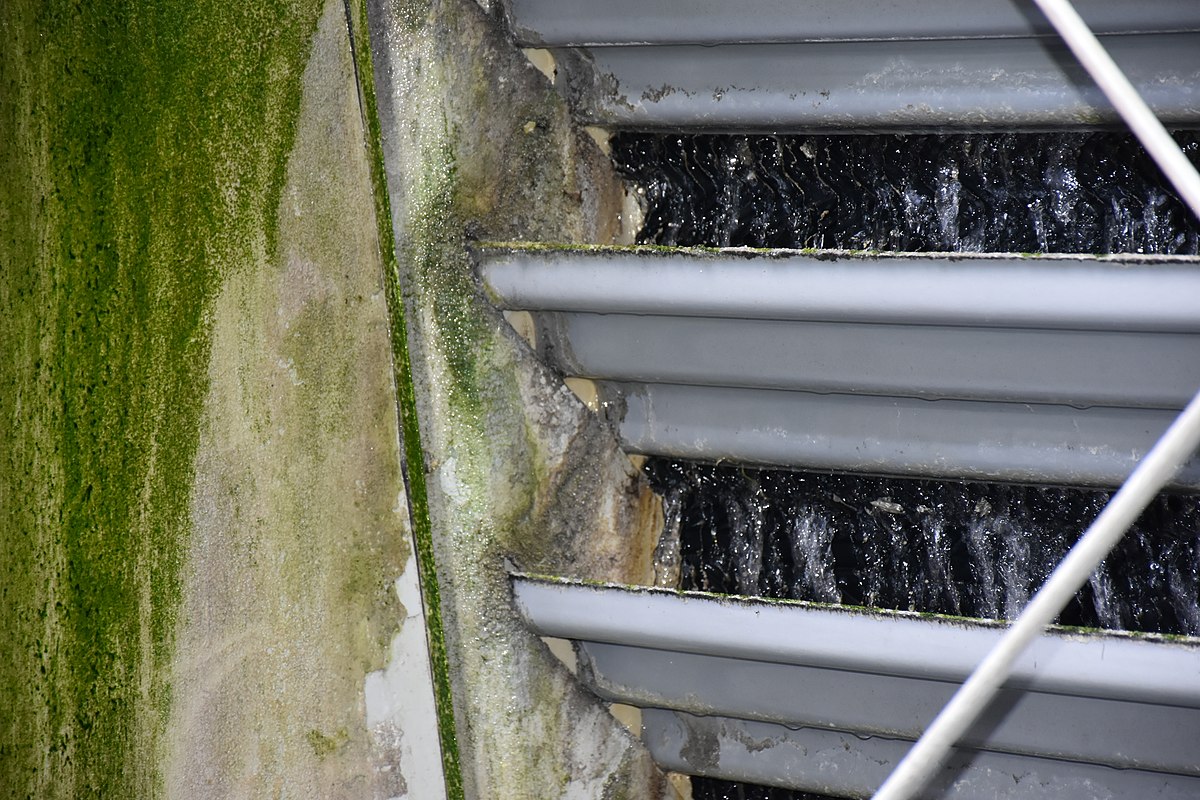
Cooling towers are crucial elements within buildings and industrial sites. They are responsible for extracting waste heat into the atmosphere through evaporative cooling using water streams to lower the temperature within the building and they do this comparatively efficiently to alternative systems.
It is therefore imperative to inform and educate operators of cooling towers on the dangers that cooling towers can pose if they are not provided with the proper maintenance and care needed to mitigate the risks that could harm public health.
Essential upkeep and monitoring of cooling towers prevent the risk of legionella outbreaks within buildings and surrounding areas. Cooling towers must be frequently monitored and assessed to ensure safety protocols are met, following the guidance of HSE legislation.
More Info: HSG 274 PART1: THE CONTROL OF LEGIONELLA BACTERIA IN EVAPORATIVE COOLING SYSTEMS

By SAF - Own work, CC BY-SA 4.0
The Dangers of Insufficient Cooling Tower Maintenance
If cooling towers aren't maintained to an efficient standard, they run a high risk of legionella contamination proliferating throughout the system. This could not only cause harm to residents/employees of the buildings and surrounding areas but in the worst-case scenario prove to be fatal to those inhaling airborne droplets of water produced by the contaminated system.
Poor management of cooling towers can therefore have severe criminal and legal repercussions for the individuals responsible for maintaining the towers, leaving them liable for enforcement action by the HSE / Local Authority Environmental Health Department.
When a bacterial disease like legionella is present within cooling towers, it poses the risk of spreading kilometres throughout the atmosphere via tiny water droplets produced by the tower.
There's not just the risk of creating legionella and other microbial activity, poor maintenance can cause corrosion and scale formation in the cooling tower. Impacting on the cleanliness and efficiency of the cooling tower system and reducing the lifespan of the system will cost significantly more to replace than maintain in the first instance.
Open and closed cooling systems
Open-circuit cooling towers are the most common type of system and operate by passing water to be cooled over a fill pack at the same time as a fan system moves air through the pack; the cooled water is then collected at the base of the cooling tower within the “pond” and then recirculated, humid air is discharged from the tower into the atmosphere via drift eliminators (to reduce the distance the aerosolised water can travel).
Whilst closed system cooling towers are designed to prevent the water being cooled coming into contact with the atmosphere and reduce the risk of contamination, post-cooling, they still pass air containing aerosolised water into the atmosphere.
Therefore both open and closed cooling systems require the same focus on diligent operation and maintenance. If not, both are capable of creating the perfect conditions for legionella bacteria to proliferate and can pose a health risk to anyone within proximity of the tower.


Recommendation and Guidelines to follow
Maintaining an effective cooling water treatment programme is the most efficient way to keep cooling towers running at their highest standard, allowing for longevity and thermal efficiency. Only through the consistent and proper care of cooling systems maintains the level of microbial contamination within safe levels.
Filtering the water regularly removes particulates that may form in the cooling system and apprehends growths that would interfere with the water flow.
What water treatment should my Cooling Tower have?
A cooling water programme should be capable of controlling not only legionella and other microbial activity but also corrosion, scale formation and fouling to maintain the system’s cleanliness.
The exact measures of a cooling tower water treatment system depend on a number of factors including the quality of feed water and chemistry of circulatory water but in general, a basic cooling tower water treatment system typically includes some type of:
-
Filtration
-
Softening/Ion-exchange

-
Chemical treatment (Manual dosing or automated)
-
Monitoring/Sampling (Automated or Manual)
Any combination of these treatments might suit your tower and make up your treatment system, so it’s important to consult with your water treatment specialist to ensure the right system for your specific tower is being considered.
Guidelines:
-
Having an extensive management plan
-
Automate anti-corrosion, anti-scale, and disinfectant addition and monitoring.
-
Manage operating times among cooling towers to prevent stagnation when multiple cooling towers or cells exist.
-
Flushing low-flow pipes weekly.
-
Monitoring and acting accordingly to water service disruptions.
-
Operate cooling tower systems at the lowest possible water temperature, and below Legionella growth range (25–45°C).
-
Maintain site-specific log sheets, test procedures, service reports, and test results on-site.
Notifying Local Authorities
Importantly if you operate a cooling tower on your premises: Under the Notification of Cooling Towers and Evaporative Condensers Regulation 1992 7, employers are required by the law to notify their local authority, in writing, if they manage a cooling tower or evaporative condenser. They must provide details on the whereabouts of the tower whether the devices are still in use. Notification forms are available from your local environmental health department.
Cooling Tower Control Scheme
SMS Environmental has a team of qualified and experienced engineers who are knowledgeable about cooling towers including their integral parts and associated plant and will ensure that the towers are maintained and monitored in accordance with HSE guidelines and legislation.
Our experienced teams undertake bespoke monitoring and auditing programmes and analysis on cooling water systems and feed water, based on the operating parameters of the system and the make-up of the water.
Our effective monitoring programmes, coupled with cleaning, chlorination and disinfection regimes, boost operating efficiency and ensure plant longevity and reliability.
Services Include:
- Cooling tower Legionella risk assessment
- Cooling tower management
- Cooling tower treatment programmes
- Cooling tower cleaning and disinfection
FOR MORE INFORMATION ON OUR RANGE OF COOLING TOWER SPECIALIST SERVICES PLEASE CALL 0800 138 21 21 OR USE THE FORM BELOW


















